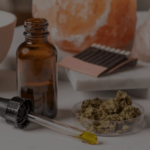CBD has become a buzzword in the health and wellness industry, touted for its numerous benefits. One of the most popular uses of CBD is for anxiety relief. Anxiety can be crippling, affecting every aspect of your life. It’s no surprise that many people are turning to CBD as an alternative treatment option. However, finding the right dosage can be overwhelming, with so much conflicting information out there. In this guide, we’ll explore what CBD is and how it works for anxiety relief. We’ll also discuss the different types of anxiety disorders and the pros and cons of using CBD for treatment. Most importantly, we’ll help you find your perfect dose of CBD so that you can start living a more balanced life!
What is CBD?
Cannabidiol, or CBD, is one of the many compounds found in the cannabis plant. Unlike its cousin, tetrahydrocannabinol (THC), CBD does not produce a psychoactive high. Instead, it has been shown to have numerous potential health benefits.
CBD works by interacting with our body’s endocannabinoid system (ECS). The ECS plays an important role in regulating a wide range of bodily functions such as mood, sleep, appetite and pain sensation. By stimulating this system, CBD can help promote balance and homeostasis within the body.
CBD is available in various forms such as oils, capsules and topicals. It’s important to note that not all CBD products are created equal. Look for products that have been third-party tested and come from reputable sources.
While research on the benefits of CBD is ongoing, early studies suggest promising results for conditions like anxiety disorders, chronic pain and epilepsy. As always with any new supplement or treatment option though it’s best to consult with your healthcare provider before trying anything new.
What is Anxiety?
Anxiety is a common and often misunderstood mental health issue that affects millions of people worldwide. It’s characterized by feelings of unease, worry, and fear about everyday situations or events. Anxiety can be caused by various factors such as stress, trauma, genetics, and even certain medical conditions.
People with anxiety may experience physical symptoms such as sweating, rapid heartbeat, trembling or shaking. They might also have persistent negative thoughts which lead to impaired functioning in social settings or at work.
There are different types of anxiety disorders including Generalized Anxiety Disorder (GAD), Panic Disorder (PD), Social Anxiety Disorder (SAD) among others. GAD involves excessive worrying about daily life activities while PD is characterized by sudden panic attacks accompanied by physical symptoms like chest pain or shortness of breath.
Social anxiety disorder causes an intense fear of being judged negatively in social situations leading to avoidance behaviors that impact daily functioning.
If left untreated, anxiety can severely affect one’s quality of life making it difficult for them to function normally on a day-to-day basis. However it can be managed through therapy, medication and lifestyle changes such as practicing mindfulness meditation or regular exercise routine among other things
The Different Types of Anxiety Disorders
Anxiety is a common mental health issue that affects millions of people worldwide. There are several different types of anxiety disorders, each with their own unique set of symptoms and triggers.
Generalized Anxiety Disorder (GAD) is characterized by excessive worry or fear about everyday activities and events. People with GAD may have trouble controlling their worrying and often experience physical symptoms such as muscle tension, fatigue, irritability, and difficulty sleeping.
Panic disorder involves sudden episodes of intense fear and panic attacks. These attacks can be extremely distressing and may cause physical symptoms such as sweating, shaking, chest pain, rapid heartbeat, and shortness of breath.
Social anxiety disorder (SAD) is an irrational fear or worry about social situations where the person feels exposed to possible scrutiny or judgment from others. This type of anxiety can interfere with daily life activities like work performance or interpersonal relationships.
Obsessive-Compulsive Disorder (OCD) involves recurring thoughts that lead to compulsive behaviors aimed at reducing the stress caused by those thoughts. The compulsions usually involve repetitive actions such as counting or cleaning which can eventually become time-consuming rituals that disrupt daily life.
Post-Traumatic Stress Disorder (PTSD) typically occurs after someone experiences a traumatic event like combat exposure, sexual assault or natural disasters; it causes intense flashbacks that can trigger significant emotional distress over time.
It’s essential to keep in mind that everyone’s experience with anxiety varies greatly depending on personal circumstances. If you think you might be struggling with any form of anxiety disorder – don’t hesitate to get professional help!
How does CBD work for Anxiety?
CBD, or cannabidiol, is a compound that interacts with the body’s endocannabinoid system (ECS). The ECS plays a crucial role in regulating various bodily functions such as sleep, appetite, pain perception and mood. When someone experiences anxiety, their body may produce an excess of stress hormones such as cortisol which can cause symptoms like increased heart rate and sweating.
CBD has been found to have anxiolytic properties by interacting with receptors in the ECS that regulate stress responses. CBD can help reduce the levels of cortisol in the body and promote feelings of relaxation and calmness.
Research also suggests that CBD may increase serotonin levels in the brain which can have positive effects on mood and anxiety. Serotonin is known as the “feel-good” neurotransmitter because it helps regulate emotions.
It’s important to note that while CBD has shown promise for treating anxiety disorders, more research is needed to fully understand how it works. Additionally, everyone’s physiology is different so what works for one person may not work for another.
CBD appears to be a promising natural option for those looking to manage their anxiety symptoms without resorting to prescription medications. However, it’s always recommended to consult with a healthcare professional before starting any new supplement regimen.
Pros and Cons of using CBD for Anxiety
CBD is becoming a popular alternative treatment for anxiety, but like any other medication, it has its pros and cons. Let’s take a closer look at what they are.
Pros:
- CBD can help reduce anxiety symptoms without causing the same side effects as traditional anti-anxiety medications.
- It may also improve sleep quality, which can be beneficial for individuals with anxiety disorders who struggle to fall or stay asleep.
- Some studies suggest that using CBD regularly could lead to long-term improvements in mood and overall mental health.
- Unlike THC (the psychoactive compound found in marijuana), CBD is non-intoxicating, meaning it won’t get you “high” or impair your ability to function.
Cons:
- Research on CBD’s effectiveness for treating anxiety is still limited, so we don’t yet know exactly how well it works compared to other treatments.
- Side effects such as dry mouth, dizziness, and fatigue have been reported by some users.
- Due to the lack of regulation in the industry, not all CBD products are created equal. Some may contain different levels of potency or even harmful contaminants.
While there are potential benefits to using CBD for anxiety relief, it’s important to carefully consider both the pros and cons before deciding if this treatment option is right for you.
What is the Perfect cbd dose for anxiety?
Finding the perfect dose of CBD for anxiety can be challenging, as it varies from person to person. It’s essential to start with a low dosage and gradually increase until you find your ideal amount.
The first thing you need to do is determine the concentration of CBD in your product. For instance, if there are 1000mg of CBD in a bottle with 30ml of oil, each ml contains approximately 33mg of CBD.
Next, consider factors such as body weight and metabolism. A general guideline is taking between 1-6 mg per every ten pounds of body weight per day. However, some people may require more or less depending on their unique needs.
It’s advisable to consult with a healthcare professional before starting any new supplement regimen, especially if you’re currently taking medication for anxiety or other medical conditions.
Remember that finding your perfect CBD dosage takes time and patience. Start small and increase slowly while observing how your body reacts until you reach the desired effects without experiencing any side effects.
Conclusion
CBD can be a promising option for individuals struggling with anxiety. It has the potential to reduce symptoms of anxiety without causing any harmful side effects. However, it’s important to remember that CBD is not a cure-all solution and should be used in combination with other therapeutic interventions.
When using CBD for anxiety, finding the perfect dose is crucial. Start with a low dose and gradually increase until you find the optimal amount that works best for you. Remember to consult with your healthcare provider before starting any new treatment plan.
If you’re considering using CBD to manage your anxiety symptoms, it’s essential to do your research and purchase high-quality products from reputable sources. With patience and persistence, finding your perfect dose of CBD could potentially make a significant impact on improving your mental health and overall well-being.





 Finding Your Perfect Dosage: How Much CBD for anxiety?
Finding Your Perfect Dosage: How Much CBD for anxiety?